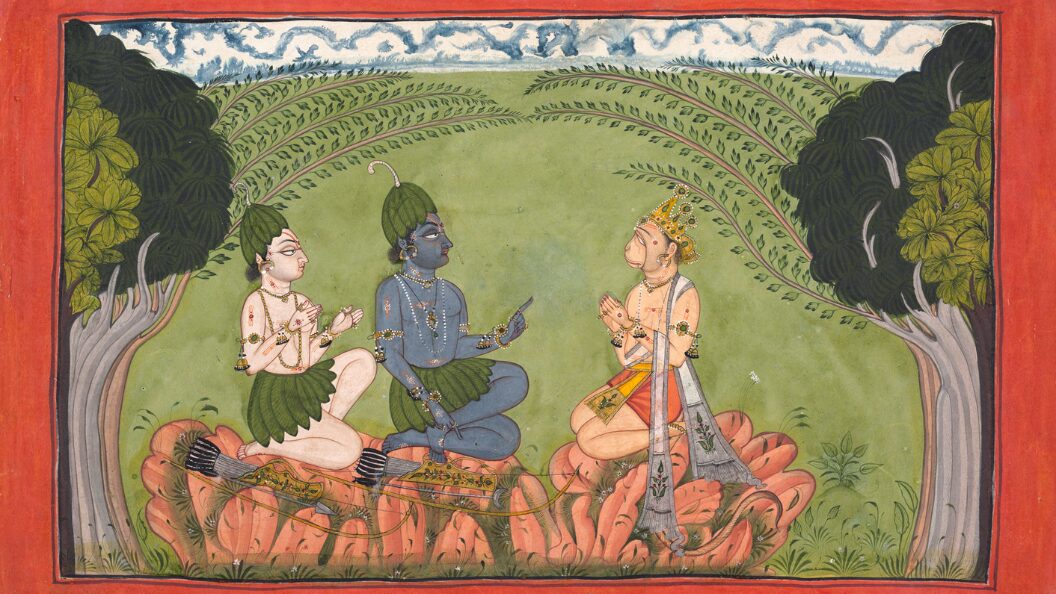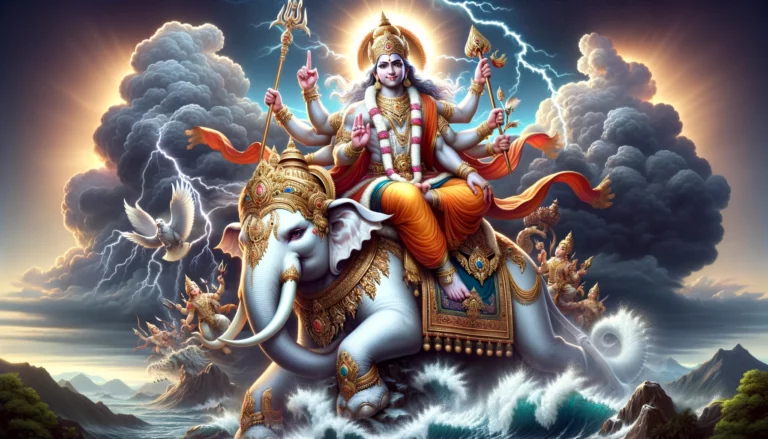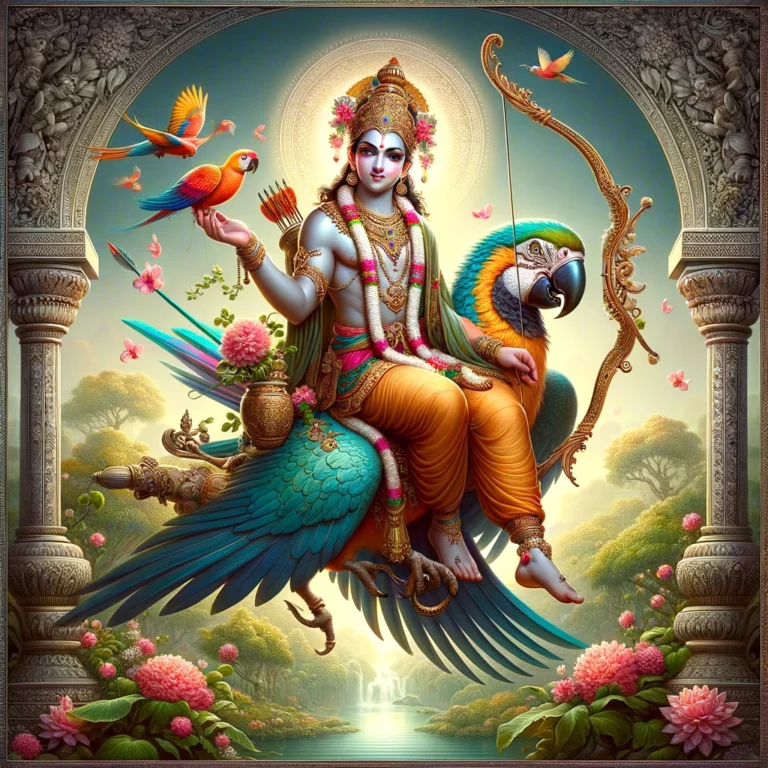Welcome to the Enigmatic World of Hinduism!
Have you ever wondered how a religion can be so magnificently diverse yet unified in its understanding of the divine?
Hinduism, a vibrant and ancient tradition, offers a unique lens through which we can explore the multifaceted nature of God. Unlike the monotheistic paths where God is viewed through a single prism, Hinduism embraces an all-encompassing perspective.
Let’s embark on a journey to uncover the foundation of the Hindu concept of God, where the infinite and the intimate merge seamlessly.

At the heart of Hindu spirituality lies the profound concept of Brahman – the ultimate, all-encompassing reality.
Imagine a presence that transcends the limits of form, time, and space, yet pulsates within every atom of the universe.
Brahman is not a distant deity residing in the heavens but the essence of everything that exists. It’s a concept that challenges our everyday perceptions, inviting us to see the divine spark in all creation.
This foundational belief paves the way for an extraordinary diversity of divine expressions.
From the majestic deities adorning temple sanctuaries to the sacred sounds echoing in rituals, each form and practice offers a unique pathway to experiencing the divine.
Hinduism teaches us that the Infinite can be approached through an infinite number of paths – a testament to the religion’s inclusivity and depth.
But how does one begin to understand the Infinite?
Through stories, rituals, and philosophical inquiries, Hinduism provides a rich tapestry of tools for the seeker.
The scriptures introduce us to a pantheon of gods and goddesses, each representing different aspects of the divine and human experience.
From the protective embrace of Vishnu to the transformative power of Shiva, these deities bring the abstract concept of Brahman into the realm of the tangible.
In this vast spiritual landscape, every seeker can find a reflection of their innermost aspirations and fears. The deities of Hinduism are not just supernatural beings but symbols of the myriad dimensions of existence.
They guide us on our journey towards understanding the Brahman, the ultimate reality that dwells within and beyond us.
Dive Deep, Seek, and Discover.
The concept of God in Hinduism invites us to explore the depths of our being and the universe. It’s a journey that transcends the confines of orthodox definitions, leading us to a place where the heart and the spirit unite in the quest for the Ultimate Truth.
Stay tuned as we delve deeper into the fascinating expressions of the divine in Hinduism, where each deity, each ritual, and each chant has a story to tell – a story of infinity, diversity, and unity.
Polytheism and Monotheism in Hinduism
In Hinduism, people believe in one big God, but also many small gods.
Think of it like this: there’s a huge ocean (that’s the big God, Brahman), but there are also many rivers (these are the small gods) that join it.
Even though there are many rivers, they all are part of the big ocean. This shows that Hinduism says you can love and worship one big God in many different ways, through many different gods.
It’s like having many doors to the same house. Whether you choose the door of Vishnu, Shiva, or any other god, you’re still getting into the same house of Brahman, the big God.
This idea helps everyone find their own special way to feel close to God, in a way that makes sense to them.
Avatars – The Descending Divinity
In Hinduism, God comes to Earth in different forms called Avatars.
These Avatars are like special visitors, who come to help people and fix big problems. Think of them as superheroes from heaven, each with their own story and powers.
One famous Avatar is Lord Krishna, who is loved for his wisdom and playful tricks.
Another is Lord Rama, known for his bravery and goodness.
These stories tell us that whenever things get really bad, God will come in a form we can see and understand, to bring back peace and goodness.
It’s like having a divine friend who shows up just when you need them the most.
The Trinity – Brahma, Vishnu, and Shiva
In Hinduism, the concept of God is uniquely captured through the Trinity or Trimurti, consisting of Brahma, Vishnu, and Shiva.
This trio symbolizes the cosmic functions of creation, preservation, and transformation, respectively.
Brahma, the creator, initiates the universe and all life within it.
Vishnu, the preserver, embodies compassion and love, maintaining balance and order.
Shiva, the destroyer, represents transformation, destroying the old to make way for the new.
Each deity’s role is crucial, reflecting the cyclic nature of the universe.
Through myths and stories, these gods convey deep spiritual truths, illustrating the dynamic and interconnected aspects of existence.
The Trimurti concept helps devotees understand the vast, complex nature of the divine, encouraging a holistic view of life’s cycles.
Goddess Worship in Hinduism
Hinduism reveres the divine feminine through Goddess worship, embodying the concept of Shakti, or divine energy. This energy is seen as the power behind all creation and life, manifesting in various forms as Goddesses.
Key figures include Saraswati, Goddess of wisdom and learning; Lakshmi, symbolizing wealth and prosperity; and Parvati, representing love, fertility, and devotion.
Each Goddess plays a crucial role in the spiritual lives of devotees, offering different aspects of grace and guidance.
This tradition highlights the balance between masculine and feminine divine forces, emphasizing the importance of both in the cosmic and worldly balance.
Through rituals, festivals, and prayers dedicated to these Goddesses, devotees seek blessings for knowledge, prosperity, and protection, demonstrating the profound impact of the divine feminine in Hindu worship practices.
Personal Gods and Devotion
In Hinduism, personal devotion (Bhakti) to a chosen deity is a heartfelt path to spirituality, where individuals form a deep, personal bond with their favored god or goddess.
This connection is not just about worship; it’s about love, surrender, and the profound relationship between the devotee and the divine.
Gods like Krishna and Shiva are not distant figures but are seen as personal friends or family members, with whom one can share their deepest fears and greatest joys.
The stories of Krishna and the Gopis, or Shiva as the protector of devotees, illustrate this intimate divine-human relationship.
Devotion is expressed through songs, prayers, rituals, and daily worship, making spirituality a lived experience.
This personal approach allows for a diverse expression of faith, accommodating the unique emotional and spiritual needs of each devotee.
Philosophical Perspectives on God
Hindu philosophy offers diverse viewpoints on God, the soul, and the universe, contributing to the religion’s rich tapestry of spiritual exploration.
The two main schools, Advaita Vedanta and Dvaita Vedanta, provide contrasting interpretations.
Advaita Vedanta, advocated by sage Adi Shankaracharya, teaches non-dualism, asserting that the individual soul (Atman) and the ultimate reality (Brahman) are one and the same. This philosophy encourages the realization of one’s own divinity as a path to enlightenment.
In contrast, Dvaita Vedanta, established by Madhvacharya, upholds dualism, emphasizing a clear distinction between the individual soul and the supreme being.
This perspective nurtures devotion to a personal God as the means to achieve salvation.
Through these philosophies, Hinduism accommodates a spectrum of beliefs, from the unity of all existence to the distinctiveness of the divine and the individual, allowing followers to choose paths that resonate with their own spiritual inclinations.
Rituals, Temples, and Sacred Texts
Rituals and temple worship play a central role in Hinduism, serving as bridges between the divine and the devotee.
Temples, considered the abode of gods, are sacred spaces where the divine presence is felt most intensely.
Rituals, ranging from simple daily offerings to elaborate ceremonies, are acts of devotion, reverence, and connection to the divine.
Sacred texts like the Vedas, Upanishads, and the Bhagavad Gita guide devotees in their spiritual journey, offering wisdom on the nature of God, the soul, and the cosmos.
These practices and texts help cultivate a deep, personal relationship with the divine, making spirituality an integral part of daily life.
Conclusion
The concept of God in Hinduism reflects a profound and multifaceted understanding of divinity, embracing an infinite spectrum of forms, philosophies, and personal relationships with the divine.
Through its rich tapestry of gods, goddesses, and philosophical insights, Hinduism offers a unique pathway for each individual to explore and connect with the ultimate reality.
This diversity, grounded in the unity of Brahman, highlights the inclusive nature of Hindu spirituality, inviting all to discover their own path within its broad and accommodating vision.
In embracing the vastness of Hinduism’s view of God, we find a reflection of the universe’s complexity and our own place within it, encouraging a journey of spiritual exploration and personal discovery.
Frequently Asked Questions
What is the concept of God in Hinduism?
In Hinduism, the concept of God encompasses a vast and complex understanding of divinity, including the belief in a Supreme Being (Brahman) that transcends form and the worship of various deities representing the Supreme Being’s different aspects. This allows for a diverse range of philosophical and theological interpretations, from monotheism to polytheism.
Who are the major deities in Hinduism?
Major deities in Hinduism include Brahma the Creator, Vishnu the Preserver, Shiva the Destroyer, Saraswati the Goddess of Wisdom, Lakshmi the Goddess of Wealth, and Parvati the Goddess of Love and Devotion. Each deity plays a significant role in the cosmic function and devotees’ personal spiritual paths.
What is the significance of Avatars in Hinduism?
Avatars in Hinduism are believed to be divine incarnations sent to Earth to restore dharma (cosmic order) and guide humanity. The most famous avatars are of Vishnu, including Rama and Krishna, who come to address specific evils and restore righteousness.
How do rituals and temples fit into Hindu worship?
Rituals and temple worship are central to Hinduism, serving as means for devotees to express devotion, earn spiritual merit, and connect with the divine. Temples are seen as the abode of gods, where the divine presence can be felt and worshipped through various rituals and offerings.


